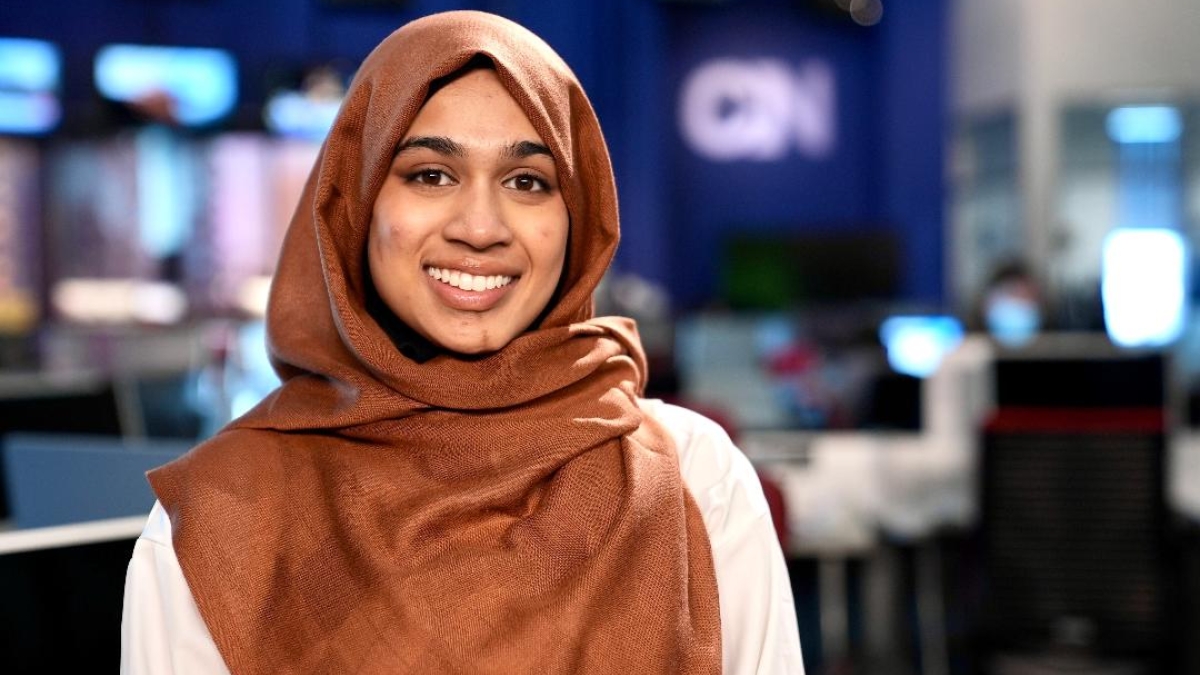Cronkite graduate wants to improve news anchor diversity

“When people see someone like me reading the news, when they see someone in a headscarf, they're kind of forced to confront their own conceptions about people like me. And while it's not comfortable, I think that's a really important thing,” said Cronkite School Outstanding Graduate Student Fatma Abid.
Editor's note: This story is part of a series of profiles of notable spring 2022 graduates.
Fatma Abid never thought she’d study journalism, let alone be honored as an Outstanding Graduate Student at the Walter Cronkite School of Journalism and Mass Communication’s spring 2022 convocation ceremony.
Growing up, Abid excelled at math and science. Being from Bangladesh, Abid said many first-generation South Asian immigrants encourage their children to pursue medical or engineering careers.
When she chose to attend Cronkite, however, Abid was met with overwhelming support, especially from her parents.
“I was really surprised and happy to hear that people in my community were so encouraging of someone like me to represent our community,” Abid said.
She realized her biggest obstacle was herself. Now, as a student graduating with a master’s degree in journalism and mass communication, Abid’s goal is to see more people like her anchoring the news.
“When people see someone like me reading the news, when they see someone in a headscarf, they're kind of forced to confront their own conceptions about people like me. And while it's not comfortable, I think that's a really important thing,” Abid said.
Question: What was your “aha” moment when you realized you wanted to study the field you majored in?
Answer: Aha moments, unfortunately, didn’t come until very recently. It was not until this semester when I was named an anchor for Cronkite News. During the auditions, I was standing in front of the camera and I thought I would be really nervous because there’s a lot of people watching and it’s a lot of pressure. I was reading the teleprompter, and it felt like everything else faded away. I was like, OK, like I was meant to do this. It took away all that uncertainty and doubt. And that was very rewarding. It came really late, but I'm glad that it did come eventually.
Q: What’s something you learned while at Arizona State University — in the classroom or otherwise — that surprised you or changed your perspective?
A: In my JMC 201 class, one of my professors was helping us learn how to write stories. He gave us the example of a woman, like a zookeeper, who died at a zoo from an animal. The details were given, and we were supposed to write a story from that. He said something along the lines of “Don’t write ‘Tragic death at the zoo.’ Tragic implies subjectivity.”
And I just remember being floored, thinking, so this is what journalists do. We don't put our own feelings into work. We try to take the news and share it as truthfully as possible. And I think that was just a moment where I was like, OK, this is what it means to be objective. That's something that stuck with me.
Q: Why did you choose ASU?
A: My brothers are all currently at ASU. And luckily we were all able to get a scholarship. Journalism was definitely really out of left field for me, but my family and parents, especially my dad, were supportive. They were like, “You're good at writing, and it’s important for our community. Why don't you try journalism?”
Q: What’s the best piece of advice you’d give to those still in school?
A: As Dory says, just keep swimming. When you’re in school, it feels like it’s never-ending. And no matter how much people tell you these are the best years of your life and it’s going to fly by, when you’re in it, you’re really in it. My advice is that if you push through, the finish line is so worth every struggle and uncertainty you have.
Q: What was your favorite spot on campus, whether for studying, meeting friends or just thinking about life?
A: I would study in the library by myself, whether that was on the Tempe campus at Noble (Library) or downtown in one of the study rooms. There’s something peaceful about being by myself. You’re always around people at college, which is fun, but it’s nice sometimes just to take a moment and step back.
Q: What are your plans after graduation?
A: In all honesty, to take a bit of a short break. I definitely want to recharge and then either try for a multimedia journalist job and then move on to news anchoring, or try for a news anchoring position.
Q: If someone gave you $40 million to solve one problem on our planet, what would you tackle?
A: Something that's always been important to me is foster care in this country. I've grown up knowing that it’s not a great system. The people are doing their best with the resources they have, but there's so many kids struggling in the system that sometimes fall through it, end up on the streets or just aren't taken care of. Putting money towards it and working with the experts in the field to try to think of innovations for this system is something I’d want to do.
Written by Olivia McCann, brand engagement and communications aide for the Cronkite School
More Law, journalism and politics

ASU experts share insights on gender equality across the globe
International Women’s Day has its roots in the American labor movement. In 1908, 15,000 women in New York City marched to protest…

ASU Law to offer its JD part time and online, addressing critical legal shortages and public service
The Sandra Day O’Connor College of Law at Arizona State University, ranked 15th among the nation’s top public law schools,…

ASU launches nonpartisan Institute of Politics to inspire future public service leaders
Former Republican presidential nominee and Arizona native Barry Goldwater once wrote, "We have forgotten that a society…

